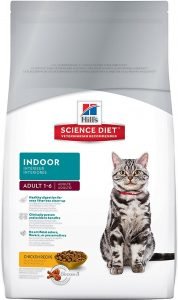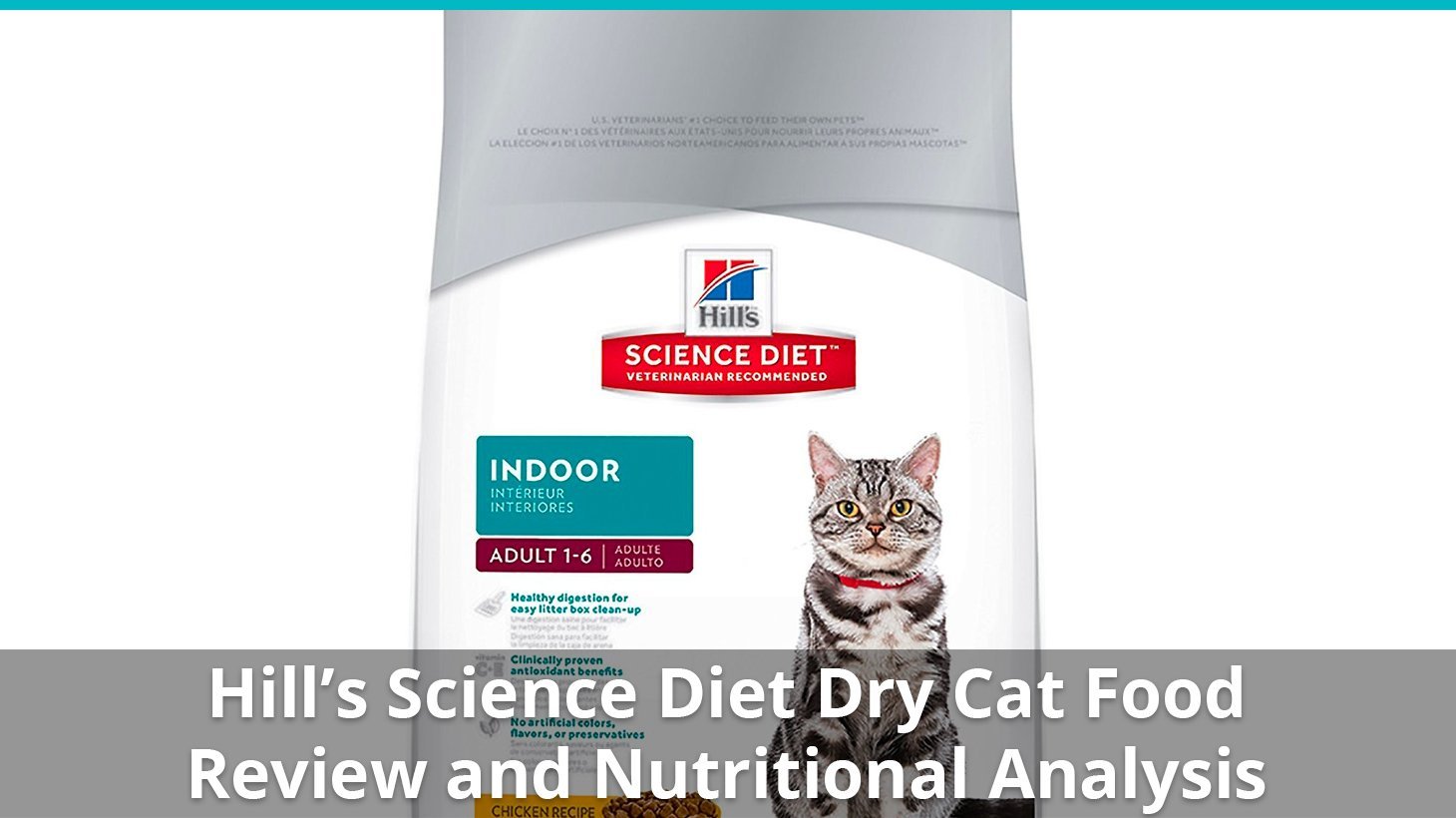Rating
- Meat is the first ingredient – 1 Star
- Uses some unnamed meats – 1 Star
- Above average protein content – 0 Star
- Less than 4 controversial ingredients – 0 Star
- Catological Discretionary Rating – 0 Star
Here’s a few important points:
- Meat is the first ingredient in all but one recipe
- Many filler ingredients are used
- Protein is very low and carbohydrates are very high
- Includes added vitamins and minerals
Hill’s Science Diet product line includes 18 wet recipes/flavors.
Each recipe below includes its related AAFCO nutrient profile when available on the product’s official webpage or packaging: Growth (G), Maintenance (M), All Life Stages (A), Supplemental (S) or Unspecified (U).
The star rating is a rough average of all of the flavors in a single line of food. If an individual recipe scored lower or higher, we will mark that below, next to the flavor.
- Hill’s Science Diet Indoor Chicken (M)
- Hill’s Science Diet Indoor Chicken (M)
- Hill’s Science Diet Indoor Kitten Chicken (G)
- Hill’s Science Diet Indoor Age Defying Chicken (M)
- Hill’s Science Diet Sensitive Stomach & Skin Rice & Egg (M) 1.5 stars
- Hill’s Science Diet Urinary Chicken (M)
- Hill’s Science Diet Optimal Care Chicken (M)
- Hill’s Science Diet Perfect Weight Chicken (M)
- Hill’s Science Diet Oral Care Chicken (M)
- Hill’s Science Diet Healthy Development Kitten Chicken (G)
- Hill’s Science Diet Light Chicken (M)
- Hill’s Science Diet Hairball Control Chicken (M)
- Hill’s Science Diet Age Defying Chicken (M)
- Hill’s Science Diet Hairball Control Chicken (M)
- Hill’s Science Diet Hairball Control Chicken (M)
- Hill’s Science Diet Multiple Benefit Chicken (M)
- Hill’s Science Diet Active Longevity Chicken (M)
- Hill’s Science Diet Youthful Vitality Chicken & Rice (M)

Hill’s Science Diet Indoor Chicken was selected to represent the other products in the line for this review.
Hill’s Science Diet Indoor Chicken
Dry Cat Food
| Estimated Nutrient Content |
| Protein | Fat | Carbs | |
|---|---|---|---|
| Guaranteed Analysis | 30% | 16% | NA |
| Dry Matter Basis | 32% | 17% | 39% |
| Calorie Weighted Basis | 28% | 37% | 35% |
Estimated Dry Matter Nutrient Content
Fiber (guaranteed analysis)
9.5%
Calories/100g
370
Is real, named meat the first ingredient?
Yes
Ingredients
Chicken, Whole Grain Wheat, Corn Gluten Meal, Pork Fat, Powdered Cellulose, Chicken Meal, Wheat Gluten, Dried Beet Pulp, Chicken Liver Flavor, Soybean Oil, Lactic Acid, Fish Oil, Choline Chloride, Potassium Chloride, Calcium Sulfate, L-Lysine, vitamins (Vitamin E Supplement, L-Ascorbyl-2-Polyphosphate (source of Vitamin C), Niacin Supplement, Thiamine Mononitrate, Vitamin A Supplement, Calcium Pantothenate, Riboflavin Supplement, Biotin, Vitamin B12 Supplement, Pyridoxine Hydrochloride, Folic Acid, Vitamin D3 Supplement), Taurine, Iodized Salt, L-Carnitine, minerals (Ferrous Sulfate, Zinc Oxide, Copper Sulfate, Manganous Oxide, Calcium Iodate, Sodium Selenite), Mixed Tocopherols for freshness, Natural Flavors, Green Peas, Apples, Cranberries, Carrots, Broccoli, Beta-Carotene
Ingredients in red are controversial or of questionable quality.
Ingredient Breakdown
The first ingredient in this cat food is chicken. Good.
While quality of the individual ingredient can vary, chicken is a very good protein source for cats.
It’s also important to note that chicken contains about 70% water, so when it is processed and cooked for use in cat food, it will become a smaller part of the total recipe.
The second ingredient is whole grain wheat. Bad.
Grains are not biologically appropriate for cats. They would never eat grain in the wild.
The moderate protein levels will contribute to the overall protein of this food, making the amount of meat in it lower than it seems.
Basically, just a cheap filler that may cause digestive upset.
The third ingredient is corn gluten meal. Bad.
Again, corn is not biologically appropriate, and most if not all corn ingredients are cheap fillers.
Corn gluten meal is used as a protein additive, but it is not as digestible as meat protein, and not what your cat needs to be healthy.
AAFCO says that it is “the dried residue from corn after the removal of the larger part of the starch and germ, and the separation of the bran by the process employed in the wet milling manufacture of corn starch or syrup, or by enzymatic treatment of the endosperm.”
Low quality ingredient.
The fourth ingredient is pork fat. Good.
Named animal fats in cat food is usually a good thing. Cats do need a fair amount of fat.
Pork fat is a decent source of healthy fats and omega fatty acids.
Chicken fat is even better, as it has less saturated fat than lard, but pork fat won’t hurt your cat.
The fifth ingredient is powdered cellulose. Bad.
This is a filler high in insoluble fiber.
It’s typically wood pulp (sawdust) from pine trees.
Too much insoluble fiber can interfere with digestion and inhibit protein and nutrient uptake.
The sixth ingredient is chicken meal. Good.
Chicken is a very good protein source for cats.
Chicken meal is a concentrated form of chicken, and is considered a high quality ingredient.
In short, much of the moisture of the chicken is taken away, and you are left with a very high-protein, low-moisture powder-like substance.
The inclusion of chicken meal helps to ensure a very high protein level.
The seventh ingredient is wheat gluten. Bad.
According to Wikipedia, wheat gluten is “made by washing wheat flour dough with water until all the starch granules have been removed, leaving the sticky insoluble gluten as an elastic mass which is then cooked before being eaten.”
It’s a popular ingredient in a vegan diet, because you can use it to make a high-protein, meat-like food called seitan.
As an ingredient in a cat food, though, it misses the mark.
It is used to boost the crude protein numbers, without having to add more meat (meat is expensive for manufacturers).
It comes from a grain, and cats don’t eat grains in the wild. We believe this is not an appropriate ingredient.
Check out TruthAboutPetFood.com for more info on the subject.
The eighth ingredient is dried beet pulp. OK, but with reservations.
Beet pulp is intended to increase fiber quantities in pet foods, and may be good for intestinal health.
However, some believe it is just an inexpensive filler.
Whatever the case, we believe that a little bit in the food isn’t detrimental to your cat, but probably isn’t a necessary ingredient.
This recipe includes a number of other ingredients, but once you get down this far, none of them will be in large enough quantities to make a real difference, except for the added vitamins and minerals.
However, there are still a few things you should know.
Peas are a quality carbohydrate, but cats don’t need much in the way of carbohydrates.
They are full of fiber, but also contain a fair amount of protein, which we should keep in mind when judging the meat content of this food.
There probably aren’t many peas in here, but there really doesn’t need to be any.
To read a more in depth article about any of the ingredients listed here, check out our Cat Food Ingredient Wiki (currently under development).
The Catological Verdict on Hill’s Science Diet Dry Cat Food
From top to bottom, this is a below average dry food.
Meat is the first ingredient in most recipes, but that’s where the positives end.
There are a lot of filler ingredients in each recipe. That means carbohydrates are too high to be appropriate for your kitty. Cats also do not digest most of these as well as they digest meat.
Protein levels should be much higher, and carbohydrate levels should be much lower.
This is NOT a good example of a dry food you should be feeding your cat.
Since it’s clear that plant products make up too much of this food, we can assume that this is a mostly plant-based food, which is not ideal for your carnivorous feline’s dietary needs.
To review, on a dry matter basis, this food is 32% protein, 17% fat, and 39% carbs.
As a group, the brand has an average protein content of 34%, and average fat content of 18%, and an average carb content of 39%.
Compared to the other 2000+ foods in our database, this food has:
- Below average protein.
- Average fat.
- Above average carbs.
Because meat is the first ingredient, but it is full of fillers and has a poor macronutrient profile, our rating for this brand is 2 stars.
Not recommended.
Hill’s Cat Food Recall History
We do not believe that a recall indicates a low quality food or company, and we respect the fact that sometimes things happen that cause a manufacturer to recall a food.
Usually these things are non-life-threatening, and we think it’s important to take a moment to be thankful about just how few recalls there really are in the industry, considering the enormous volume of food produced.
However, we do believe that a history of recalls may point to a larger issue with a company, and that discerning consumers want to know who they’re buying from, especially when it comes to something as important as the food you feed your beloved cat.
Here is a list of recalls that have affected the Hill’s brand in the past:
- May 2016 – High iron levels – UK and Russian products affected
- November 2015 (“Withdrawal”, not Recall) – Labeling issues – Multiple dog recipes affected
- June 2014 – Possible salmonella – 1 recipe affected
- April 2007 – Melamine – 1 recipe affected
- March 2007 – Melamine – Multiple cat food recipes affected
If you want to stay up to date on the latest recall information affecting your cat’s food, sign up to our email list and receive an email every time a recall is announced. We’ll also let you know about any updated ratings, recipe changes, or new cat foods on the market. (Our alert system will be launched shortly, check back soon.)
Where To Buy Hill’s Science Diet Dry Cat Food
We recommend purchasing your pet products from Chewy.com. They continually prove that they walk the walk while talking the talk, and I’ve never dealt with a more dedicated pet-parent base of people than those who work at Chewy.
Plus, they offer 20% off and free shipping on lots of orders.
Not Convinced?
Check out our ratings and reviews of the best cat foods in our comprehensive, data-backed guide right here.

